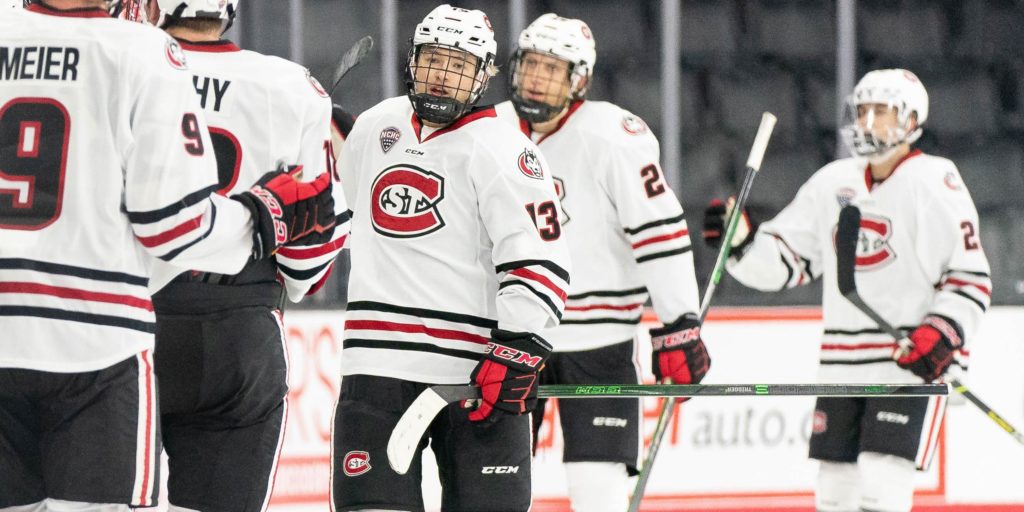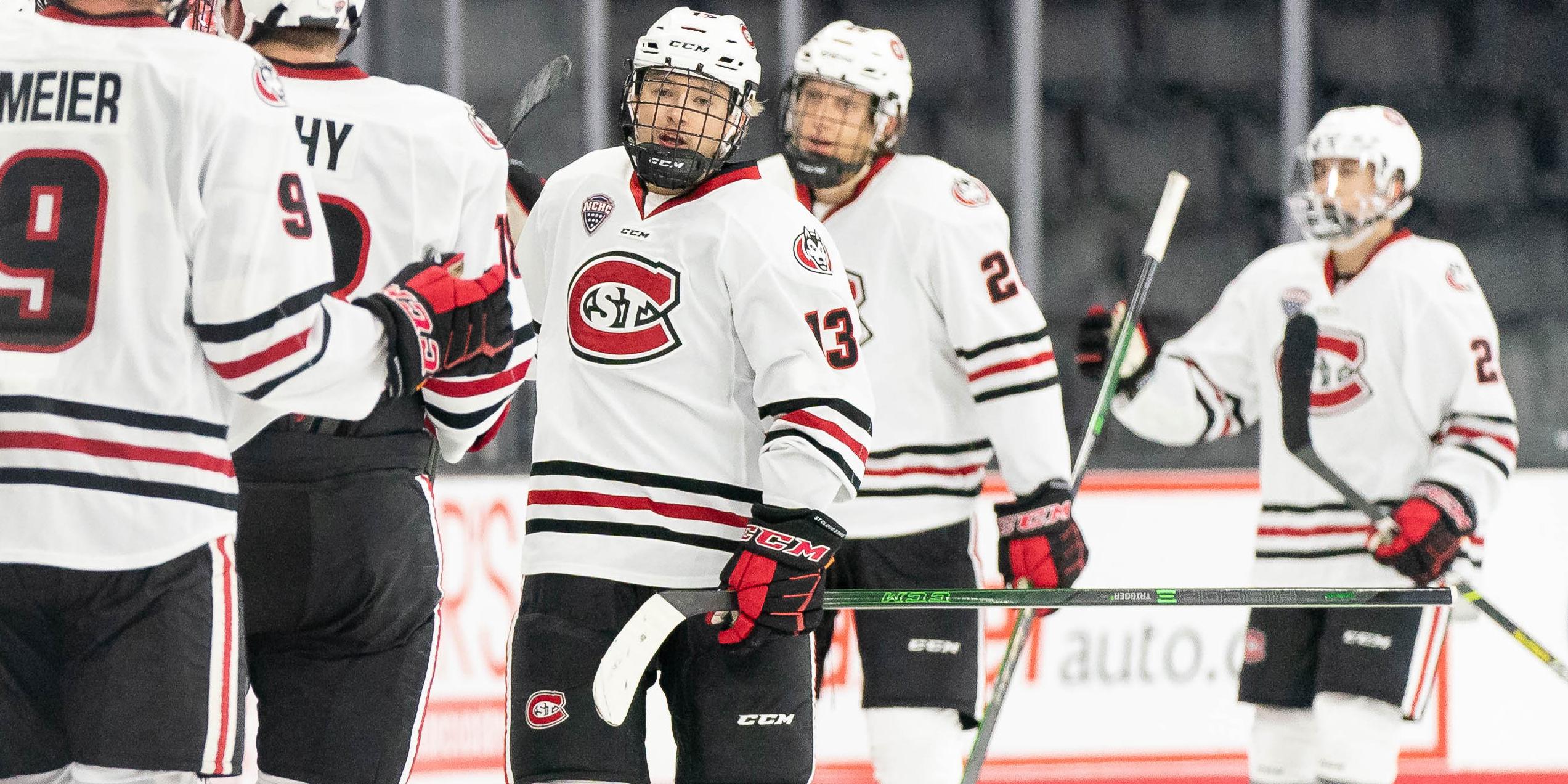
When former Omaha coach Mike Kemp became the school’s associate athletic director for events and facilities in March of 2019, he couldn’t have anticipated the kinds of hours he’s working these days.
Under normal circumstances — remember those? — Kemp would keep regular weekday hours at his Baxter Arena office and show up a couple hours before games on weekends. Now, though, the five-year-old arena is midway through hosting the three-week NCHC pod as the conference looks to safely begin the season amid the ongoing coronavirus pandemic.
For Kemp, this means working 18-hour days at Baxter, leaving shortly before midnight to the same hotel that Omaha’s hockey team is staying at for the duration of the pod event. It had always been stipulated that all eight teams would be accommodated equitably, and the Mavericks, Kemp and two of his former players, current UNO head coach Mike Gabinet and assistant Dave Noel-Bernier, are being sequestered when not at their home arena.
“I’m certainly here longer during the day, and this is more like a tournament where you’re accommodating eight teams,” Kemp said in an interview Tuesday. “You’re constantly looking at how teams are moving from locker room to locker room, and there are more responsibilities.”
Kemp still has his other administrative responsibilities for UNO’s athletic department, on top of overseeing what happens in the NCHC pod. Games aren’t going late into the night, but Kemp holds regular review meetings with NCHC commissioner Josh Fenton, and Kemp also helps to make sure Baxter Arena’s overnight ice maintenance staffers are ready to help make sure that the arena’s sheet is good to go for the following day.
To that end, Cory Portner, director of St. Cloud State’s Herb Brooks National Hockey Center, has been brought in to coordinate the ice crew. Portner is a former U.S. Ice Rink Association membership and training director, and was a lead instructor for the organization’s certified ice technician training program.
Baxter Arena has about 300 employees, although around 50 are at the arena at any one time during the duration of the NCHC pod. Staff members are rotated through, and Kemp and other arena officials work to make sure the right people are in the right places. There are other moving parts too, as teams are cycling between UNO’s home locker room, the regular hockey visiting team’s locker room, plus UNO’s men’s and women’s basketball teams’ dressing rooms at Baxter.
In all, six locker rooms are used for games during the NCHC pod, and two more spaces by the adjacent practice ice sheet are also seeing use.
Arena workers, hockey players, coaches, team staffers and media members aren’t the only people coming and going during the NCHC pod, though. The Omaha-based University of Nebraska Medical Center brings workers to Baxter to help with coronavirus testing.
Players, official team travel party members, Kemp and other Tier 1-designed personnel inside the pod are tested four times per week. All Baxter Arena employees are being tested, with the frequency depending on where in the arena they’re working.
“This is probably the biggest reason it was brought to Omaha, and it’s the real reason we’re doing this: the safety of the athletes, and the ability to test,” Kemp said. “UNMC is incredible as far as the ability to safely test, and the protocols we had to put in place for health and safety are the things that are the most important, and the Med Center gave us the advantage there.
“They’re the foremost experts in epidemiology, and you think back to the Ebola crisis (in 2014), and they brought people from Africa to UNMC. That made it a no-brainer for the college athletic directors and presidents to make the decision to bring (the NCHC pod) here.”
Not that the NCHC pod is the first event of its kind. Kemp and other UNO officials took notes on what the NHL did in finishing its 2019-20 season in two separate Canadian bubbles.
“We picked their brains, and when someone does something as well as they did it, you want to learn from them,” Kemp said. “There are certain things that are significantly different between what a NHL can do compared to a collegiate situation, but for the most part, we took the things they did that we wanted to do here and applied them, and it’s been extremely successful.
“For example, it’s how teams move around the building and how they secure practice locker rooms, where they store and how they store excess equipment. When you travel with a team, you travel for a four-day weekend, but now we have teams here for a month, so it’s what we do with excess equipment, how they store it, are they going to ship it here, and all these kinds of things that we needed to get a grasp on.”
Just as the NCHC pod isn’t a totally new concept, it may not be the last of its kind either. The 2021 NCAA men’s basketball national tournament is expected to take place entirely in Indianapolis, and similar pods could be set up for the college hockey postseason.
If that’s the case, Kemp has some advice based on what he has seen so far in Omaha.
“I think the whole key to doing anything like this is the ability to maintain health and safety of the athletes, and that’s the critical area,” he said. “As long as you can be in a situation where you can ensure that, you can probably run an event that you can count on being able to complete.
“The testing protocols that each of the (NCHC member) institutions instituted before coming here, under the direction of the league, and then the processes that we’ve had in place since everyone has arrived, helps to monitor and ensure and gives us the ability to react quickly to a potential problem that could develop should a positive test show up. Those are the things that are the greatest benefit of doing something like this, where everybody’s in one place and you have a controlled environment where you’re testing frequently.”
Kemp might be longing for his own bed, but he’s happy with how the NCHC Pod has worked thus far.
“We’ve got a good handle on the ice, and that and health are your big concerns,” Kemp said. “That has worked well, and the hotels have worked with us to shut down the hotels the teams are in, where the players are safe in a sequestered environment.
“The things that are controllables, we’ve been able to control, and at this point in time, hopefully that continues for the next two weeks and we’re able to pull this thing off.”
CC starts late, wins shootout in first game
A player’s positive COVID-19 test result recently forced Colorado College to pause all team-related activities for 14 days, leading the Tigers to begin their time in the NCHC Pod later than the league’s other seven teams.
When CC finally hit the Baxter Arena ice late Tuesday morning, though, they got to work on what would become a 3-3 tie against Western Michigan. The Tigers then won a shootout, 2-1, to grab a second point in the NCHC standings.
The Tigers never trailed but were still taken beyond the 3-on-3 overtime period. Grant Cruikshank and Ben Copeland had given CC a 2-0 lead after 20 minutes, but back-to-back goals from WMU’s Paul Washe tied the game in the second period. Hunter McKown soon put CC ahead again, but the Broncos’ Hugh Larkin forced overtime on a goal with 5:54 left in regulation.
McKown and Josiah Slavin scored for CC in the shootout, and Tigers goaltender Matt Vernon stopped three shots to go with his 33 saves during the game.
CC continued NCHC pod play Wednesday night against Omaha, falling 6-1, with freshman Jack Millar netting his first collegiate goal.
UND’s Bernard-Docker, Weatherby kneel before opener
In a demonstration against racial injustices and inequities, North Dakota juniors Jacob Bernard-Docker and Jasper Weatherby both kneeled while the national anthem was played last Wednesday, Dec. 2, ahead of UND’s season-opener against Miami.
Bernard-Docker and Weatherby are believed to be the first NCAA Division I men’s hockey players to take a knee for the anthem, in a years-old form of athlete demonstration that came out of a 2016 discussion between then-San Francisco 49ers quarterback Colin Kaepernick and Nate Boyer, a Green Beret.
The two UND players involved in last Tuesday’s demonstration have stated that they are strong supporters of military members. Both of Bernard-Docker’s grandfathers fought in world wars.
They only planned to kneel for the anthem for UND’s first game, and haven’t done so since. They are, however, striving to continue antiracist work off the ice, and they both belong to UND’s student-athlete inclusion and diversity organization.
